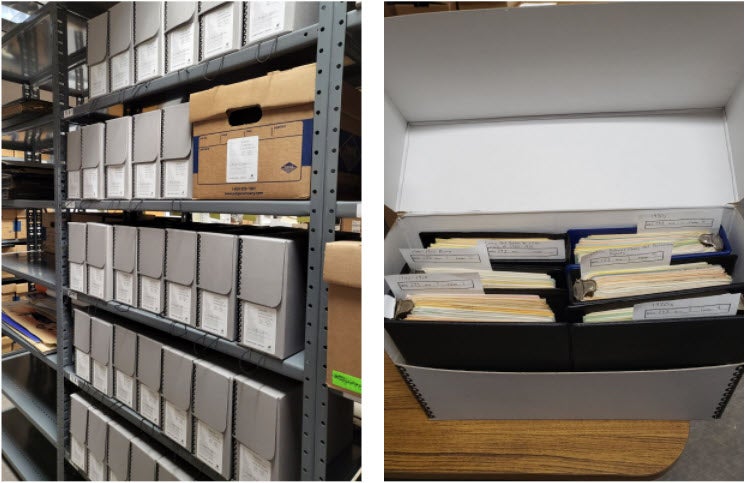Special Collections and Archives is excited to announce that the Hugh T. Lovin Papers are available for research. Chelsea Cates, the volunteer project archivist, shares her experience organizing the collection.
The work to process Lovin’s papers began in the summer of 2021 as a volunteer project. I had recently graduated with a Master’s degree in Library Science and moved to the Pacific Northwest and was looking for an opportunity to gain more hands-on experience with archival collections. I reached out to the Head of Special Collections and Archives, Director Cheryl Oestreicher, and Archivist Gwyn Hervochon about the possibility of working on a project at Boise State and they suggested focusing on Dr. Lovin’s papers as they were still unprocessed and contained research on topics, like irrigation and the U.S. labor movement, that would be of interest to current scholars.

Dr. Lovin was a history professor at Boise State from 1965 until his retirement in 1993. Lovin’s research and scholarly output focused on a range of topics including the American Communist Party’s involvement in the Spanish Civil War, the U.S. labor movement and third party political groups, President Lyndon Johnson and the Subversive Activities Control Board, and the history of irrigation in the west, Idaho in particular. After his retirement from BSU he continued his research and published frequently, often in “Idaho Yesterdays,” the scholarly journal of the Idaho State Historical Society. His papers have recently been processed and are currently available for research in the Special Collections and Archives at Albertsons Library.
Dr. Lovin’s research binders make up a good portion of his collection, filling 35 out of 74 boxes. The binders include handwritten and typed notes and their citations, photocopied materials from manuscript collections, books and periodicals, and some newspaper clippings. Some binders contain notes on a specific topic (e.g., the Twin Falls Irrigation Project or the Idaho Non-Partisan League) and follow a clear outline while others seem to be used more as a compilation of notes and sources on broader topics. There are 107 binders focused on irrigation, 37 on labor movements and third party political groups and two on President Johnson and the Subversive Activities Control Board.
Other research materials in the collection include file folders of loose notes on specific individuals and topics, photographs used to illustrate his published articles, collections of newspaper clippings, microfilm reels, publications (both bound and photocopied) and finding aids and other guides for archival collections.
Dr. Lovin’s diligent internal organization and labeling system was extremely helpful during the processing stage of the project as I arranged and described his collection. I followed his lead and grouped his materials by topic and within each topic, by material type. There are six series, or topic groups, in the Lovin collection:
- Irrigation,
- U.S. Labor Movement and Third Party Political Groups,
- President Johnson and the Subversive Activities Control Board,
- The Spanish Civil War,
- Publications, and
- Teaching and Early Academic Career.

Within each series, materials are placed into subseries based on material type: binders, file folders, research publications and microfilm, and newsprint. A detailed description of the contents of the collection can be found in the Hugh T. Lovin Papers, 1861-2011 finding aid. Alisha Graefe and Nathan Hawley also contributed to the finding aid.
For information about how to access the collection, please see the Using the Collections page.
Chelsea Cates,
Volunteer Processing Archivist, Summer 2021